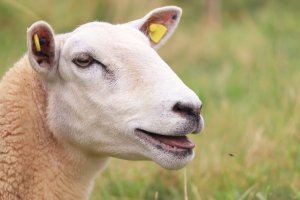Millions of animals are suffering unnecessarily by being slaughtered without stunning to meet religious demands.
That's why we campaign to end religious exemptions to animal welfare laws.
Animal welfare law requires animals to be stunned before slaughter to minimise their pain, suffering and distress. The only exemption is for Jewish and Muslim communities to meet kosher and halal religious dietary preferences.
The scientific consensus is clear that it is more humane to stun an animal prior to slaughter. The slaughter of animals without pre-stunning is permitted in the UK despite a recommendation by the government's own advisory body, the Farm Animal Welfare Council (FAWC), that the practice should be banned. FAWC concluded that animals slaughtered without pre-stunning are likely to experience "very significant pain and distress".
RSPCA, Compassion in World Farming and the British Veterinary Association all support an end to non-stun slaughter to improve animal welfare at the time of death.
- 70% of Brits think stunning animals before slaughtering them is more ethical.
- 72% of the population think food produced from religious non-stun slaughter methods should be clearly labelled.
We support the right to religious freedom. But this is not an absolute right. Religious exemptions shouldn't be made to laws meant to prevent unnecessary animal cruelty.
Take action!
1. Write to your MP
Ask your MP to end the religious exemption that allows animals to be slaughtered without pre-stunning.
2. Share your story
Tell us why you support this campaign, and how you are personally affected by the issue. You can also let us know if you would like assistance with a particular issue.
3. Join the National Secular Society
Become a member of the National Secular Society today! Together, we can separate religion and state for greater freedom and fairness.
Latest updates
NSS welcomes plans for non-stun slaughter labelling
Posted: Tue, 14 Sep 2021 11:56
The National Secular Society is calling for the public to support proposals for meat from animals not stunned before slaughter to be accurately labelled.
The proposals form part of a government call for evidence on reforms to food labelling to improve animal welfare and consumer choice.
Animal welfare legislation requires all animals to be stunned before slaughter in order to minimise avoidable pain, distress, or suffering. The only exemption is for religious communities to meet Jewish and Muslim religious dietary preferences. The religious exemption has been widely criticised by secularist and animal welfare organisations.
Labelling for non-stun slaughter
The consultation, launched by the Department for Environment, Food and Rural Affairs, asks if products containing meat should be mandatorily labelled to indicate the method of slaughter.
There is currently no requirement for meat from animals killed without stunning to be labelled as such. In 2018 the NSS found non-stun halal and kosher meat was widespread in UK supermarkets, without clear labelling to indicate the slaughter method.
All animals killed for kosher meat are slaughtered without stunning. While the majority of animals slaughtered for halal meat are stunned, a significant proportion are not.
Some parts of animals killed by Jewish ritual slaughter methods are not themselves regarded as kosher and are therefore sold on the general market unlabelled.
And in 2018 90,000 of the 2.9 million non-stunned animals slaughtered for kosher meat were rejected as unfit for religious consumption and went into the general market unlabelled.
Animal welfare concerns
The consultation does not propose to remove religious slaughter exemptions, saying the government "respects the rights of Jews and Muslims to eat meat prepared in accordance with their beliefs".
The government's own advisory body, the Farm Animal Welfare Council (FAWC), has recommended these exemptions be removed due to the "very significant pain and distress" animals suffer when slaughtered without pre-stunning.
Other organisations that support an end to religious exemptions on slaughter regulations include the RSPCA, the British Veterinary Association and the Federation of Veterinarians of Europe.
In 2020 the European Court of Justice ruled that restricting non-stun slaughter was not an undue infringement of the right to religious freedom, provided it was conducted for a legitimate purpose such as protecting animal welfare.
NSS comment
Megan Manson, head of research and policy at the NSS, said the government's proposals were a "welcome development".
She said: "A clear, mandatory label indicating slaughter method is vital to provide genuine consumer choice for the majority of Brits who do not want to eat meat from animals that were slaughtered without stunning. We encourage all those who support mandatory labelling to respond to the consultation."
"However, labelling will not be enough to end the unnecessary suffering of the millions of animals killed by non-stun religious slaughter methods in the UK every year.
"The UK should follow the example of the growing number of countries that do not compromise their animal welfare laws through religious slaughter exemptions. Religious dietary preferences should not trump animal welfare."
The deadline to respond to the consultation is 6 December 2021. You can read the consultation and respond here.
Image by Manfred Richter from Pixabay
Religious privilege causing injustice, NSS tells Law Commission
Posted: Wed, 4 Aug 2021 14:23
The National Secular Society has argued that religious privilege creates inconsistencies and unfairness in laws on education, charity, health and animal welfare in response to a consultation.
The NSS has submitted evidence on these issues to the Law Commission, which has sought views on what should be included in its latest programme of recommended legal reforms.
The commission is a statutory independent body that keeps the law of England and Wales under review and recommends reform where it judges that it's needed.
NSS recommendations
The NSS said the commission should consider:
- Laws requiring collective worship in schools.
- The provision in charity law which makes 'the advancement of religion' a charitable purpose in its own right.
- The lack of effective protection for boys in laws on genital cutting.
- The religious exemption to animal welfare laws that allows non-stun slaughter.
- Assisted dying law.
Law on collective worship
Sections 70 and 71 of the School Standards and Framework Act 1998 require that all state-funded schools in England and Wales "shall on each school day take part in an act of collective worship".
Even in schools with no religious designation, the worship must be "wholly or mainly of a Christian character".
The NSS's submission said this law was incompatible with human rights laws and the principle of equality, and opened the door to inappropriate external evangelism in schools.
Charity law
In laws on charity throughout the UK, 'the advancement of religion' is a recognised charitable purpose in its own right.
The NSS's submission said removing this would ensure greater fairness and mitigate the damage that harmful religious organisations cause.
The NSS made the case for removing 'the advancement of religion' as a charitable purpose in a report, For the Public Benefit?, published in 2019.
Religious organisations would still be able to register for charitable status under another recognised charitable purpose, as many already do.
Genital cutting
The NSS's submission called on the commission to consider the disparity between the protections afforded to boys and girls regarding autonomy over their genitals.
It noted that boys are not given explicit protection from non-consensual, medically unnecessary circumcision or other modifications to their genitals.
It said this was incompatible with human rights law and left many at risk of serious harm.
Animal welfare
The society highlighted the religious exemption from animal welfare laws that allows animals to be slaughtered without stunning according to Jewish and Muslim rites.
There is widespread consensus among veterinary and animal welfare groups that it's more humane to stun an animal before slaughter than not to do so.
The NSS argues for the repeal of the religious exemption, and for the labelling of meat from animals subject to non-stun slaughter while the exemption remains in place.
Assisted dying law
The NSS also called on the commission to draft a legal framework for assisted dying, to guide potential legislation.
The society said a disproportionate level of influence is granted to religious groups in debates on assisted dying, and argued that the views of the general public, professionals and relevant organisations should be fairly reflected at policy level.
It said a framework could help to guide the government into formulating compassionate and safe legislation to allow for assisted dying under certain circumstances.
NSS comment
NSS head of policy and research Megan Manson said: "Our reforms identify several significant ways in which religious privilege within the law causes inequality, injustice and harm.
"Deference to religion has helped to create outdated, unfair and often unnecessarily complex laws in these areas. We hope the Law Commission will consider our recommendations as it outlines its next programme for reform."
About the Law Commission's review
- The Law Commission undertakes a public consultation every few years, with a view to submitting a draft programme of law reform to the lord chancellor.
- This is the commission's 14th programme of reform. The 13th was submitted in late 2017.
Image: Jarretera / Shutterstock.com.




